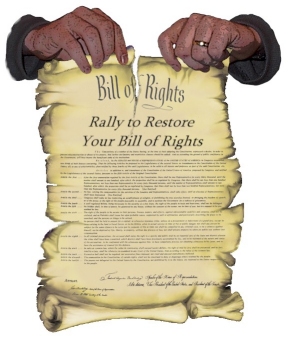
Jonathan Rauch rings the warning bell about civil liberties and the rule of law in his latest column in the National Journal, “Bush’s Battle Endangers The War.” After a brief review of the effects of past wars on civil liberties, Rauch notes,
Bush, in contrast, seems determined to treat the war on terror as a permanent emergency. The administration says the 2001 use-of-force resolution allowed the government to collect battlefield intelligence here at home, superseding FISA. Invoked immediately after an enemy attack, that argument makes legal and strategic sense. Warrantless domestic surveillance and legal improvisation seem fine for four days, four weeks, or even four months.
But four years — with no end in sight? Bush seems to have had no intention of regularizing his surveillance program by building a legal framework for it. Instead, his plan apparently was to run a secret domestic spying program outside the boundaries of conventional law for, well, how long? Decades? Forever?










This should be the biggest news story & political issue, for Americans at least. Bush has somewhat openly put into place all the needed mechanisms for a police state — warrantless searches, arrests without warrants, holding people indefinitely without charge-evidence-judicial oversight or legal counsel, torture are all well-documented. So is surveillance of such “terrorist” groups as ACLU. It appears that the U.S. also operates secret prisons and kidnaps people in other countries in defiance of local laws. Then the president bristles when a reporter dares ask him if there are any limits at all to presidential power.
I don’t understand why Americans of all political persuasions aren’t up in arms over this.
The violation of American rights and the Constitution is nothing new. Every Congress and every Adminsistration has allowed it and has done so since President George Washington’s use of force by miltiamen in the Whiskey rebellion of 1794.
All libertarians should be very concerned about the uprooting of civil liberties. However, to portray this as a recent phenomenom is a little naive. This been going on since the installment of the U.S. constitution. Therefore, I will say that the American people especially minorities are used to there Constitutional rights being violated.
The major problem is lame Congressional representatives and senators that allow the American people’s rights to be trampled on. They have the Constitutional power to stop a president and his administration from circumventing the law.
Mr. Bond: you are correct that violation by the federal government of the Constitution and of individual risghts is nothing new. But you are mistaken if you argue that there’s nothing new in the Bush administration’s activities. The administration has put in place and uses all of the instruments of a full-blown police state, and argues that these mechanisms need remain in place so long as the “war on terror” goes on, which appears to mean forever.
What’s new here isn’t that the gov’t is violating rights, what’s new is wholesale removal of multiple checks against a police state.
I cannot understand the “ho-hum, it’s nothing new” reaction.
Mr. Steele,
“….what’s new is wholesale removal of multiple checks against a police state.”
I am afraid, from a libertarian point of view, that this is not new. A number of Administrations were allowed by Congresses to by-pass checks on power. The most well known are Abe Lincoln, Woodrow Wilson, FDR, LBJ, Richard Nixon, Bill Clinton, and now G. W. Bush. I am sure there are many more to be named, but these names come up very much more than others in libertarian literature.
“I cannot understand the “ho-hum, it’s nothing new” reaction.”
For me, as a libertarian, I am not surprise that the abuse of power by the powers that be. As I mentioned above, American history is full of examples concerning a miscarriage of government. However, this does not mean I am okay with it. I involve myself in Blog debates against big government, I give my congressional representatives an ear full, and I collect & read all the info about and how to fight these abuses.
Thankfully, there are a lot of libertarian books, and websites that I can read and go to arm myself with a lot of intellectual ammo.